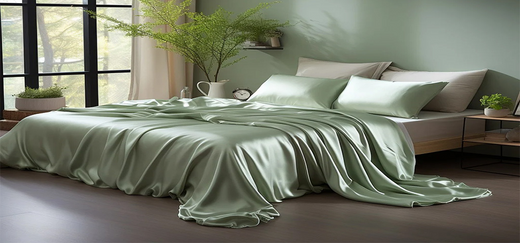All of us pick our beds according to how they make us feel in the store and according to what is in the special sale, without regard to what that may mean to our health. Here's what's true: your bed setup just might be the problem behind your sniffles all morning, restless nights at night, or overall general dissatisfaction. Let's break it down and have your bed set up for comfort, hygiene, and a solid, restful sleep.
1. Consider Your Sheets: Cotton Isn't Always The Queen
Cotton is the most conventional one because it is affordable and softer to sleep in. However, it is a disaster for dust mites. They live inside your bed, feeding on your skin flakes, and deposit droppings that cause allergies to people. Different studies show that 10% of people have this allergy to dust mites, causing them morning congestion, sneezing, or even asthma symptoms.
I learned this the hard way. For 33 years, I stuck with cotton and woke up sick every day. Then I switched to silk sheets—and in one week, I felt a dramatic difference. If you're considering silk, go for mulberry silk or vegan silk made out of eucalyptus, which is a more premium natural option, breathable, hypoallergenic, and sustainable.
Avoid satin, even "vegan silk." Satin is traditionally made from synthetic polyester that tends to entrap heat and moisture. Compare this with eucalyptus silk: you gain a feel that wicks away moisture and keeps you cool at night—a real game changer for hot sleepers.
2. Mattress Protector: The Unsung Hygiene Hero
Let's begin with your mattress. It sucks up everything, including your sweat, dead skin, and spills, with time. This makes it a breeding ground for bacteria, dust mites, and mold. Since you cannot wash your mattress in the washing machine, invest in a high-quality, waterproof, dust-mite-proof cover.
Add a topper for extra comfort and breathability if you can afford to do so. Besides, this layer extends the life of your mattress besides giving it protection from allergens. Scientific studies show that exposure to dust mites is reduced significantly by using allergy-proof covers on mattresses and pillows, thus improving respiration.
Pro Tip: If you’re sick, diffuse peppermint oil in your room. It can promote sweating, helping your body eliminate toxins faster. But remember, sweat means moisture, and moisture can lead to mold. This is why having breathable, moisture-wicking sheets like eucalyptus silk is essential.
3. Watch Out for the air: Clean Your Fan and Add Humidity.
Your ceiling fan is probably circulating more than just air, probably circulating dust and allergens as well. A simple biweekly wipe really makes a difference in air quality.
So, regarding air quality, you really need a humidifier if you are in a dry climate or using the AC all the time. Dry air can mess with your nose, making it uncomfortable or even leading to nosebleeds. And try to keep the humidity around 30-50%.
4. Breathe Easy with HEPA Filtration
If you wake up most nights with a stuffy nose and itchy eyes, it's about time you get a HEPA air purifier into your home. HEPA will capture all particles as small as 0.3 microns, which comprise dust, pollen, and certain bacteria, making the air from your bedroom clean and reducing most allergy symptoms.
5. Silk Pillowcase: Beauty and Health
Combined Silk pillowcases are luxurious but practical too. Unlike cotton, it doesn't absorb oils and skincare products from your face which could prevent acne. A smooth surface of silk will also minimize friction, lowering the chances of waking up with creases or wrinkles.
Additionally, it is already a natural dust mite repellent, so it's appropriate for allergy sufferers. Decorative blankets or throw pillows on your pillow are a bad thing since they carry dust mites or bacteria, undoing all the good of your new, allergen-free system.
6. Moods: Lavender, Tea, and Good Sleep
Making a sleep-inducing bedtime routine that maximizes the quality of sleep one gets is extremely easy: spray some lavender mist on the bedding so that it smells sweet and helps you relax. Lavender is known to minimize anxiety levels and improve the possibility of falling asleep. Combined with a nice cup of sleepytime tea, like valerian root or some other kind of herb, you're all set to relax.
7. Bonus Tips for Better Sleep
Wash your bedding weekly. Dust, sweat, and skin cells accumulate quickly, so regular washing is non-negotiable. Use hot water to kill dust mites.
Avoid potent perfumes. Fragrant detergents may be irritating to sensitive skin or sinuses; use hypoallergenic laundry products.
No pets on the bed. We love them dearly, but pets bring allergens, dirt, and dander onto the bed.
Conclusion
By rethinking your bedding and bedroom setup, you’re not just creating a comfortable sleeping space, you’re investing in your health. Switching to natural, breathable materials like silk can make all the difference.
If you’re ready to elevate your sleep, consider SilkX Co.’s silk bedding products. Made from fancy mulberry and vegan eucalyptus silk, these pillows are here to keep moisture at bay, kick dust mites to the curb, and give you that super cool, comfy sleep vibe. Waking up feeling fresh, allergy-free, and ready to take on the day with SilkX Co., it's really time you made your bed the cozy retreat you deserve.

